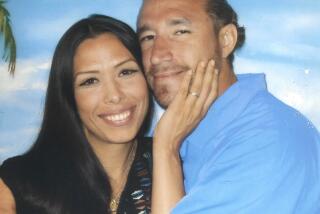Judge Reverses Verdict on Detaining Patients : Rights: The original finding, saying that pychiatrists who held people against their will could be sued, had been hailed as a victory for the mentally ill.
Tossing out a jury verdict that had been lauded as advancing the legal rights of the mentally ill, a San Diego Superior Court judge said Thursday that psychiatrists who keep patients confined against their will at public hospitals cannot be sued.
Judge Alpha Montgomery reversed the verdict--and a $52,778 award--in favor of Rosalie Crawford, a 58-year-old Long Beach grandmother who had been locked in the psychiatric unit of UC San Diego Medical Center beyond a legally prescribed period.
Doctors at the hospital kept Crawford locked up last summer for six extra days, even after she sought release, her attorney contended in winning the June 15 verdict. But Montgomery ruled that the verdict had to be overturned because state law traditionally has made public entities and employees immune from suit.
Under court procedures, the claim for immunity could not be made until after the jury verdict had been returned, said the lawyer for the hospital, Robert Cosgrove. He said he believed it was sound policy to assure doctors and hospitals that they were protected from financial liability when they exercised professional discretion.
âThe doctors could well have put this woman out on the street and exposed her or others to danger,â Cosgrove said. âI would be very concerned under those circumstances.â
Crawfordâs lawyer, Michael Coleman, promised an appeal of Montgomeryâs ruling. The jury verdict was significant, he said, because advocates of rights for the mentally ill had viewed it as a signal that patients retained the basic right to direct their own lives.
Coleman said he had been in contact Thursday with public-interest groups that expressed an interest in joining the appeal.
âIn effect, what (the judge ruled) is that psychiatrists working for a public entity can confine someone in a locked unit without following the law,â Coleman said.
State law permits a hospital to hold mentally ill people against their will for 31 days. During those 31 days, a court can order that a conservator, a person authorized for up to a year to consent to treatment for the patient, be appointed.
Occasionally, a hospital will encounter a patient who has no conservator but who doctors feel should not leave the hospital, even though the 31-day involuntary treatment period has expired.
When that happens, a hospital may opt to keep the person beyond the 31 days while it files a special legal proceeding that asks a judge to tell the facility whether it should release the patient.
Last August, Crawford was found wandering around a menâs bathroom at Lindbergh Field. She said that witches were after her.
She was taken to UC San Diego Medical Center, where doctors said she continued to have delusions for more than a month. A temporary conservator was appointed until a hearing could be held on whether a one-year conservatorship should be granted.
Because Crawford is from Long Beach, the hearing was scheduled for Sept. 15 in Los Angeles County. But her UCSD doctors believed she was too ill to attend that hearing.
Repeatedly, according to Coleman, Crawford asked to be released and refused to take medication. But she was kept locked up anyway, and was injected with drugs when she refused to swallow them, he said.
When Crawford failed to appear for the Sept. 15 hearing, the conservatorship proceeding was dismissed and the hospital no longer had any authority to hold her, Coleman successfully contended at the jury trial.
But the hospital kept Crawford while it pursued the special proceeding. San Diego Superior Court Judge J. Perry Langford ordered her released Sept. 21.
It was in the six days between the time the conservatorship proceedings ended and the time Langford ordered Crawfordâs release that she was confined illegally and made to take medication she expressly refused, Coleman said.
The jury agreed, finding that the hospital falsely imprisoned Crawford and committed battery on her when doctors forced medication on her during the last part of her stay.
The hospital had contended at the trial that Crawford was too ill to take care of herself. It also said hospital officials were not notified of the end of the conservatorship and gave notice that it intended to file the claim for immunity.
More to Read
Sign up for Essential California
The most important California stories and recommendations in your inbox every morning.
You may occasionally receive promotional content from the Los Angeles Times.










